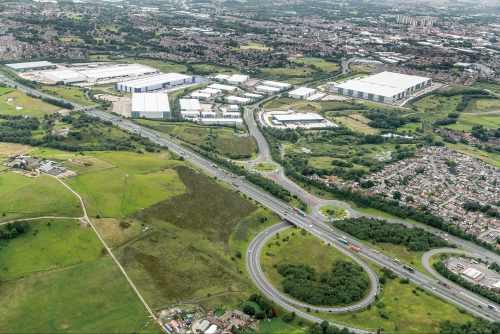NW ‘UK industrial hotspot’ due to tight supply, rising population and transport links

The North West region is increasingly interest from investors and developers in industrial property due to its stable occupier market and above-average rental growth prospects, alongside other tailwinds.
CoStar Group, a US-based provider of information, analytics and marketing services to the commercial property industry, says that, while the Midlands golden triangle and London are often the first stop for buyers seeking industrial property, the North West is emerging as a hotspot.
The region’s availability rate of 4.5% is among the lowest in the UK regions, not just across the sector as a whole but across multiple size bands. The small- and mid-box segments are particularly tight, as is the smaller end of the big box market, whose 4.8% availability is around half the rate of London and the South East.
Grant Lonsdale, Senior Director of Market Analytics at CoStar Group, said: “The region’s tight supply-demand conditions have continued to draw a response from developers in recent months, even against a backdrop of high build costs and a sluggish national economy.
“After announcing plans for a 2.5 million sq ft rail-linked logistics scheme in Liverpool’s freeport zone, Tritax Symmetry recently got the green light to develop a 270,000 sq ft speculative warehouse at Halsnead Garden Village in Knowsley.
“Further east along the M62, Manchester-based Russells has outline consent to expand HPark in Heywood to nearly two million sq ft.”
He added: “These schemes sit within wider mixed-use developments that will see nearly 3,000 new homes built, adding to the pipeline of other consented residential developments and the 20,000 new homes that broke ground across the North West in the year to September, according to the latest official statistics.”
Based on a rough estimate that each new home in the region requires 100 sq ft of warehouse space to service its delivery needs these housing developments alone could generate upwards of two million sq ft of occupier demand, he said.
But the North West is not just a local distribution market, he added.
Its links to the M6 and M62 connect its towns and cities to major population centres such as Leeds, Birmingham and Glasgow in two to three hours. The Humberside ports can be reached in around two hours from Rochdale where Cabot Properties is funding a 200,000 sq ft two-unit development at Kingsway Business Park.
Overall, developers are under way on 11 million sq ft across the region, about one-fifth of the national total, which will go some way towards replenishing its ageing warehouse stock. In Manchester, almost one third of warehouses are three decades old or more, with less than 10% developed in the past decade.
Mr Lonsdale said: “While Manchester’s shortage of modern buildings might be problematic for occupiers, it may be a boon for existing building owners, who have enjoyed double digit rental growth over the past four years.
“Liverpool and Cheshire have fared similarly well. Conversely, rent gains are plateauing in some southern markets as affordability remains stretched following an extended period of high inflation and elevated interest rates.”
He added: “Some of the strongest rent growth has been recorded in the multi-let segment, which enjoys a diverse occupier mix and low supply. Demand for urban hubs to serve Manchester’s business base and growing population, whose 17% expansion in the past decade has vastly outpaced the UK’s other core regional cities, has put significant upward pressure on multi-let rents.
“Within a half hour drive of the city centre, they have doubled in the past six years, far exceeding the gains seen in other northern markets like Glasgow and Newcastle.”
Constraints on supply are unlikely to be alleviated any time soon because, despite recent growth, rent levels are insufficient to make developing smaller units viable. The base build cost can be well north of £100/sq ft, more than double that of big boxes.
Mr Lonsdale said: “Such dynamics continue to pique the interest of investors. Indeed, the keen pricing of several recent investment deals suggests investors remain confident in the local industrial sector’s ability to generate decent income returns.”
Earlier this month, M&G bought Stockport Trading Estate, an 11-unit scheme spanning 170,000 sq ft, from CBRE Investment Management for £23.8m, reflecting a 4.3% yield and a 15% uplift on the asking price. Rents at the estate top out at £12.50 per sq ft, but could be increased through refurbishment. The possible expansion of the Metrolink could generate further upside.
In another transport-related deal, Transport for Greater Manchester snapped up Downing Street Industrial Estate, a nine-unit ‘ultra urban’ estate with a low average passing rent, for £15.5m. That deal showed a three per cent yield, likely tied to its alternative use value, and was 40% above the asking price.
KKR and Mirastar’s deal to forward-fund a half-a-million sq ft cross-docked logistics facility in Widnes for £65.4m, or £120 per sq ft, in the opening weeks of this year will be seen as another vote of confidence.








